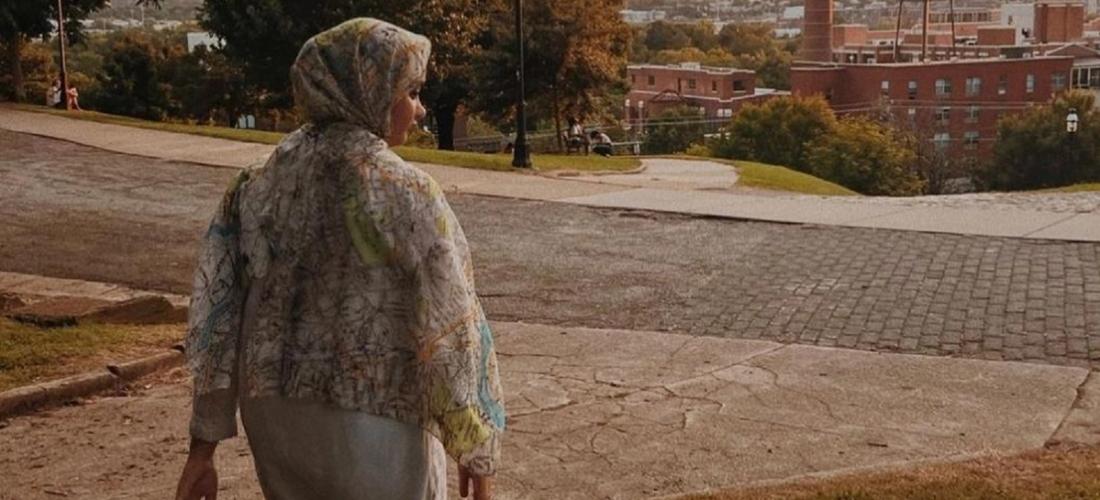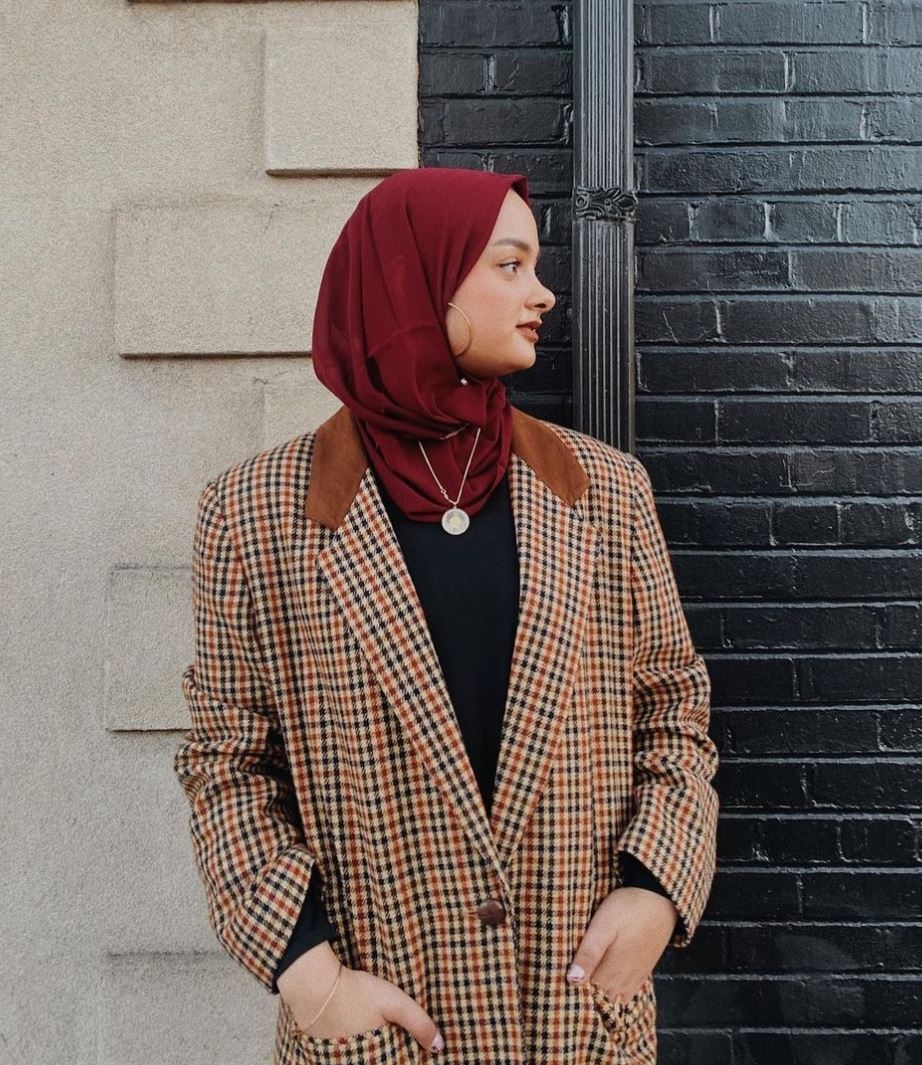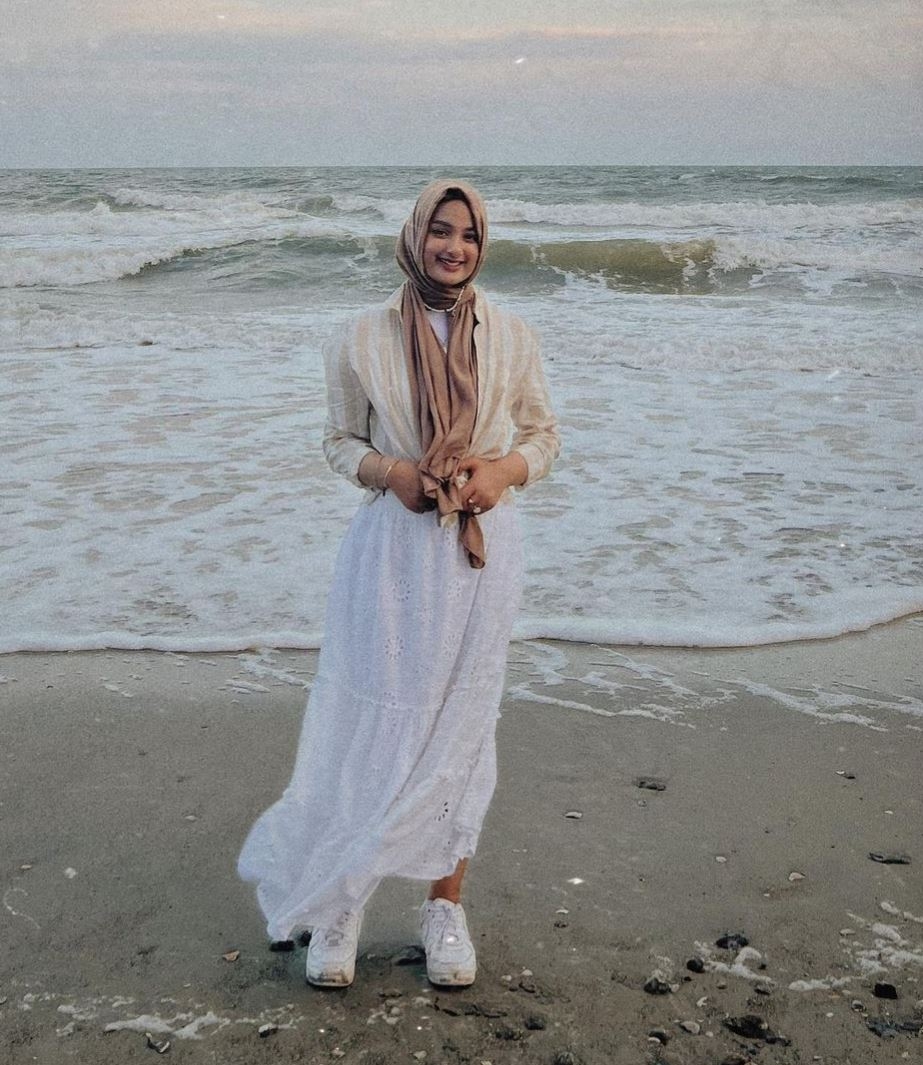One Year of Hijab and a Reckoning of Faith – How I Chose Islam for Myself
Faith
|
Jan 26, 2023
|
6 MIN READ

The author walking in her hometown.
Editor's note: It's our annual #LikeYouMeanItHH beginning-of-the-year reflection time! What does it mean to "wear it like you mean it?" We invite you (and ourselves) to renew our intentions and reflect on what our hijab (and faith and other areas of our lives) mean to us.
By A. Ali
Bismillah. In the name of Allah, the most Beneficent, the most Merciful.
Verily in the remembrance of Allah do hearts find rest.
My first months in college were, in many ways, a crisis of my faith.
I grew up in a tight-knit, deeply religious Muslim family, Alhamdulillah. Islam served as a binding factor in our family unit, tying us all together and giving us solace in some very difficult years of hardships and turmoil. Masha’Allah, my family is very resilient, and I give credit to Allah (S) for the strength we find in each other’s love. My younger brother H taught me patience and independence in thought. Baba taught me to have a strong work ethic and true, selfless dedication to others. My older brother D Bhai taught me love – unconditional, unfiltered love. Mamma, with all the grace and sacrifice in the world, taught me deen (faith).
Mamma taught me to pray. Mamma taught me sirat-al-mustaqim. With great patience, Mamma also taught me the full and complete meaning of the hijab. She showed me the value in a humble and modest heart that glows from the inside out. She knew, however, that the hijab was an intensely personal lifelong journey that I would have to embark on alone, so she gave me quiet guidance and let me figure out the rest.
For many years, I was unsure that I would ever find the strength to wear the hijab. In all raw honesty, I did not envision the hijab in my future for a long time. When I envisioned myself, I saw myself thusly: hair uncovered, body somewhat covered, but struggling to navigate and understand the “whys” behind the examples of modesty that my Lord had given me.
(Struggling to dress modestly for your body type? Here's how to create an effective capsule collection.)

The author, wearing our Chiffon in Bordeaux.
I understand now that I thought that way because the hijab is my jihad (personal struggle). The hijab is my struggle. Not the garment itself, but the concept of modesty as a whole. It took me many years to come to the place where I am now, and there are several factors that explain why that is. One, I was blessed to be surrounded by many Muslim women in my extended family who had put on their hijab much earlier in life, Masha’Allah, and who grew up with Islamic influence that was both in and out of their households.
My life was different.
One, of course, my mother is and has always been a beautiful example of the hijab. My grandparents have been extensively involved in my life, and the learning of Quran and surahs came from my paternal grandmother. And, our family was very much committed to our faith practices of salah, Ramadan, zakat and general Muslim living.I did, though, go to public school for most of my education surrounded by non-Muslim peers.
My concept of religion was tied to my home, and it did not extend much past those walls. Sure, our family attended Jummah and Eid prayers at our local masajid, and I went to Sunday school. But we weren’t that connected to mosque life for a variety of reasons.
(Is your child in public school? Here are some effective communication tips to talk to teachers and admin about being Muslim in a public school setting.)
Two, the world that I entered (school) as soon as I left my home was full of bad or (at the very least) questionable influences. Many activities and general practices that Islam advises us to avoid were prevalent and normalized. Nonetheless, I still had the comfort of a Muslim home to return to every day, where I would be nurtured by a group of people that lived and breathed the religion and practiced a healthy balance of deen (faith) and dunya (worldly pursuits).

The author wearing Bamboo Woven in Fawn.
In college (when I lived on campus in the dorms), I did not have that comfort every day anymore. Therefore, there was no one who could enforce me to continue following the tenets of Islam that I had been surrounded by my whole life. Any step I took towards or away from religion was completely of my own volition. No one could tell me what to do or how to do it.
And so, my first months in college were a crisis of my faith.
It is true what they say: Every Muslim, regardless of whether they are a convert/revert or whether they grew up in a Muslim household, has to choose Islam for themselves. There is no other person that can make that decision for you. With independence comes the choice of either making the conscious, everyday decision to live your life in God’s name and in His service, or living your life some other way.
In those first months, I very easily could have made the choice to live my life some other way. It is hard to explain, but only I know how deeply my heart was tempted. I thank God that He welcomed me back into His arms with all the mercy and no shame, because I quite literally crawled my way back to Him. This crisis of faith had thrown me headfirst into the throes of a deeply impactful bout of depression.
Simply put, I was in a dark place. I owe so much to my family because they lovingly put the broken pieces of me back together during that time. But, they were only able to do so because I got down on my knees, found the scattered pieces myself, and put them in their hands. And I needed light to do that. Allah (S) lit a candle and beckoned me into His loving and gracious embrace. He showed me where the pieces were, and how I could get them back.
Allah (S) saved my life. Incredibly, the hijab, which I started wearing a year ago in my second semester of college, also became my reprieve in my weakest moments. This is astonishing to me, and a true sign of God’s miracles. Because I never thought I would have the strength to put it on. Yet it was my safe space as I worked with God, myself and my family to figure out my life and build anew.
It is true what they say: Every Muslim, regardless of whether they are a convert/revert or whether they grew up in a Muslim household, has to choose Islam for themselves. There is no other person that can make that decision for you. With independence comes the choice of either making the conscious, everyday decision to live your life in God’s name and in His service, or living your life some other way.
A. Ali
The hijab confirmed my shahadah. For me to understand that the only thing I needed to get through life was God’s love and grace, I had to know how it felt to stray so far away from it. I had to remember that I was chosen by Allah (S) to be Muslim, and when I remembered that, I came to the conclusion that God had also given me the honor of choosing me to be hijabi. And, what a glorious honor it is.
When I remembered why I had been chosen for the gift of Islam, it seemed the only right choice to thank Allah (S) for it every day by wearing hijab, to wear it for His sake. He worked magic in my life. I was brought down to my knees before Him in fervent prayer trying to navigate my way out of the stormiest of seas, and He brought me back to shore with such forgiveness and warmth only befitting of the Almighty.
Growing up, I never understood what it meant when people said that the love of Allah is 70 times that of the love of your mother. I understand it now.
Building full and complete trust in Allah’s (S) plan and understanding that this dunya (the world) can never compare to the riches of your deen (faith) and the Hereafter was the hardest thing I have ever done. I hope I can hold onto this understanding throughout my life. Alhamdullilah for what I went through to get there, because only Allah (S) could have written such a beautifully redemptive arc for my story.
Why would I not trust Allah (S) when the story He has written for me is infinitely more perfect than anything I could have ever written myself? He is al-Musawirr, the Fashioner. And He fashions all forms with perfection.
Subscribe to be the first to know about new product releases, styling ideas and more.
What products are you interested in?

